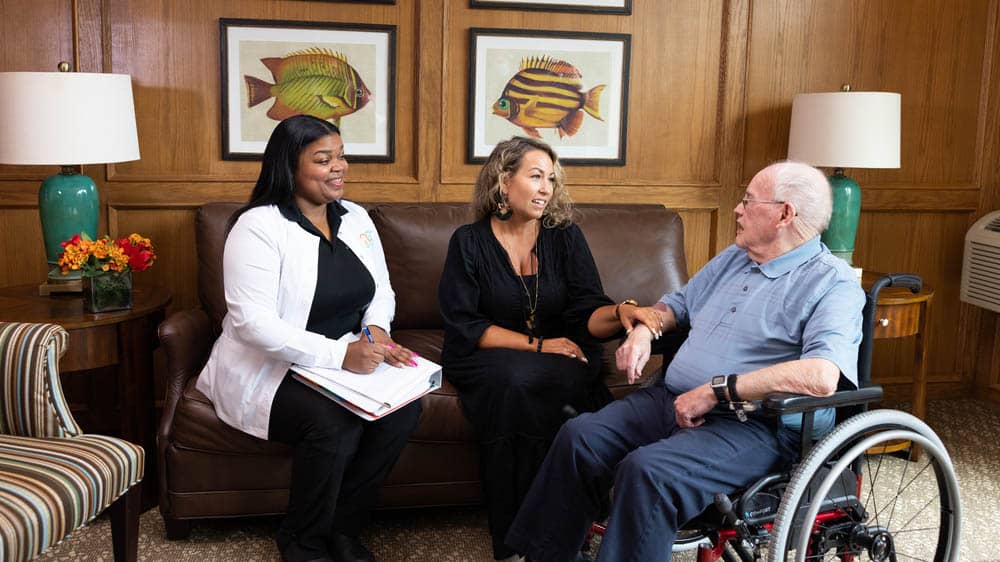

Dear Caregiver, Please Take Care of Yourself, Too
Talk about self-care seems to be everywhere these days, mainly because Americans feel more stressed than ever before. A 2019 article in the New York Times explored the results of a Gallup poll that found Americans to be among the “most stressed people in the world,” with stress levels reported to be the highest in a decade.
Research has shown that stress levels are typically higher for the nearly 44 million people who provide unpaid care for their loved ones. Stress can have a negative impact on the mind and body, and even lead to caregiver burnout if not managed properly.
The Dangers of Caregiver Burnout
Caregiver burnout is a condition described by the Cleveland Clinic as “a state of physical, emotional and mental exhaustion. It may be accompanied by a change in attitude, from positive and caring to negative and unconcerned. [It] can occur when caregivers don't get the help they need, or if they try to do more than they are able, physically or financially.”
Burnout can affect your health, your family relationships, and your job. In fact, a recent study from Harvard Business School found that American businesses are facing a caregiving crisis, with more and more workers stepping into a caregiving role without work policies that support them. More than 80% of the employees surveyed felt that their caregiving duties affected their productivity.
The best way to avoid burnout when caring for a loved one is by taking time for yourself. Any flight attendant will tell you that you need to put on your own oxygen mask first before trying to help other people — that is true with caregiving, as well.
How to Practice Self-Care
A big contributor to caregiver burnout is guilt. Most family caregivers do not take time for themselves because they feel guilty for stepping back or slowing down. But without making a conscious effort to practice self-care, you will not be able to continue to provide quality care to your loved one. Here are some ways you can let go of the guilt and make time in your life for self-care:
- Put “me time” on your calendar. Schedule time for things like exercise, meditation or reading a book, just as you would any other activity in your life. When you make a preemptive commitment to giving yourself the time you need to do something that rejuvenates you, it becomes harder to avoid taking time to do it.
- Keep a journal. Writing in a journal will help you identify and acknowledge your complicated feelings about being a caregiver. You have a right to your feelings, and talking about them or writing about them can be cathartic.
- Schedule time with friends. If your social life has fallen by the wayside as a result of caring for a loved one, making a concerted effort to socialize can have a positive impact on your health and well-being. Friends can lend an ear when you need it, provide a shoulder to cry on, offer advice based on their own experiences, and sometimes just give you a necessary distraction and some hearty laughs. It really does take a village, so don’t be afraid to tap into yours regularly!
- Eat well and get more sleep. What we eat has a big impact on how we feel, and when we’re short on time, we don’t always make healthy choices. Being busy and stressed can also have a negative impact on sleep, and the combination of poor diet and lack of sleep is a recipe for disaster. Making small changes — like cooking and prepping big batches of healthy meals for the week on Sundays, or going to bed an hour earlier than usual — can have a big impact on your physical and emotional health.
- Try mindful activities. Taking up a meditation practice, going to a yoga class, or learning how to do tai chi are all proven methods of mindfulness and relaxation. Studies have shown that participating in regular mindfulness activities can have a positive impact on stress, sleep, mood and fatigue.
- Invest in respite care. If you’re concerned about your loved one being alone as a result of you taking a vacation or time for yourself, consider hiring a caregiver for respite care through Right at Home. There’s no long-term commitment with respite care, and it will give you the peace of mind you need to truly take a break from caring for your loved one.
There are many ways to combat caregiver burnout, but all of them begin with self-care. Since September is National Self-Care Awareness Month, we’re challenging you to find ways you can practice self-care this month. Leave a comment below or tell us how you’re indulging in self-care this month on Twitter @rightathomeUS.







